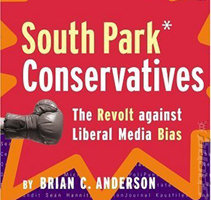US Conservative Media – Videogames Are Good
Washington Post takes free speech, pro-gaming stance.

Brian C. Anderson, the infamous author of the much-hyped book on the demise of liberal media power in the US, South Park Conservatives: The Revolt Against Liberal Media Bias, - has written an interesting op-ed piece in today's Washington Post.
The piece is a direct attack on what Anderson claims to be an "increasingly noisy chorus of critics [who] charge that the video-game industry--whose receipts now top the Hollywood box office--threatens to transform American kids into drooling zombies or out-and-out sociopaths."
Anderson goes on to stress the hysteria isn't surprising, as it's a well-known fact that new media have always met with suspicion and fear from the public at large. Indeed, he traces this "neophobic" tendency all the way back to Plato, who argued in the "Phaedrus" that the relatively new-fangled medium of writing corrupted the memory-building powers of oral culture.
What is of most concern to Anderson is this: "That the critics of video games are not only conjuring up a threat where none exists; they're ignoring the positive moral lessons and cognitive benefits that many of today's sophisticated games offer."
It's an argument we've heard many times before, but the difference here is that it is being published in one of conservative America's main daily newspapers.
Anderson continues in his attack on the Hilary Clinton and Jack Thomson 'ban these evil games' brigade, citing: "A recent survey from the Progress and Freedom Foundation, a free-market think tank, found that more than 80% of the top-selling titles for the past five years came with the video-game industry's "Everyone" or "Teen" ratings, meaning that parents can assume reasonably inoffensive game content. About 15% of 2005's games received "Mature" or "Adults Only" ratings - surprisingly few, given that 65% of gamers are 18-to-34 year-olds."
Anderson goes on to quote from research being undertaken at the University of Illinois and the University of Michigan, which has found that prolonged playing of Asheron's Call 2 - a gory online multiplayer fantasy - didn't make study participants more belligerent.
He also focuses on the arguments that many games, particularly non-violent and social games such as The Sims, are usefully overlooked in most negative analyses of games on individuals and on the wider culture, concluding that: "Video games are popular culture at its best. Critics would do better to drop the hysterical laments and pick up a joystick."
The piece is a direct attack on what Anderson claims to be an "increasingly noisy chorus of critics [who] charge that the video-game industry--whose receipts now top the Hollywood box office--threatens to transform American kids into drooling zombies or out-and-out sociopaths."
Anderson goes on to stress the hysteria isn't surprising, as it's a well-known fact that new media have always met with suspicion and fear from the public at large. Indeed, he traces this "neophobic" tendency all the way back to Plato, who argued in the "Phaedrus" that the relatively new-fangled medium of writing corrupted the memory-building powers of oral culture.
What is of most concern to Anderson is this: "That the critics of video games are not only conjuring up a threat where none exists; they're ignoring the positive moral lessons and cognitive benefits that many of today's sophisticated games offer."
It's an argument we've heard many times before, but the difference here is that it is being published in one of conservative America's main daily newspapers.
Anderson continues in his attack on the Hilary Clinton and Jack Thomson 'ban these evil games' brigade, citing: "A recent survey from the Progress and Freedom Foundation, a free-market think tank, found that more than 80% of the top-selling titles for the past five years came with the video-game industry's "Everyone" or "Teen" ratings, meaning that parents can assume reasonably inoffensive game content. About 15% of 2005's games received "Mature" or "Adults Only" ratings - surprisingly few, given that 65% of gamers are 18-to-34 year-olds."
Anderson goes on to quote from research being undertaken at the University of Illinois and the University of Michigan, which has found that prolonged playing of Asheron's Call 2 - a gory online multiplayer fantasy - didn't make study participants more belligerent.
He also focuses on the arguments that many games, particularly non-violent and social games such as The Sims, are usefully overlooked in most negative analyses of games on individuals and on the wider culture, concluding that: "Video games are popular culture at its best. Critics would do better to drop the hysterical laments and pick up a joystick."
Comments
Do you think he's trying to get down with the kids or that he might be gamer?
SPOnG should get an interview with him!
SPOnG should get an interview with him!
He has a point though... The best selling games out there aren't GTA or DOOM3 or whatever (sure they sell a couple of millions) but it's The Sims, Pokemon, Tetris! and as proven by the DS puppies and wandering around a small random created village where you can design you own stuff and send lettres to other people seem do quite nice too.. Not really you're average bloody gore stuff now is it.
Ignoring that is kind of very non-scientific when saying "games are turning our youth into idiots!" They never played Brain Training probably (i wonder how much it allready sold in the US and Europe...)
Ignoring that is kind of very non-scientific when saying "games are turning our youth into idiots!" They never played Brain Training probably (i wonder how much it allready sold in the US and Europe...)
